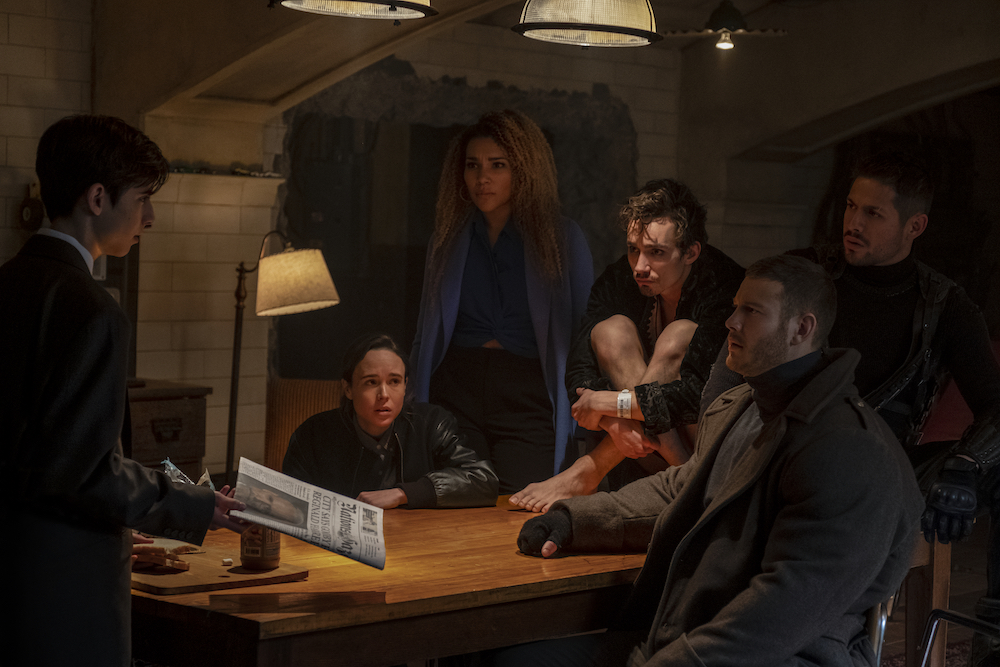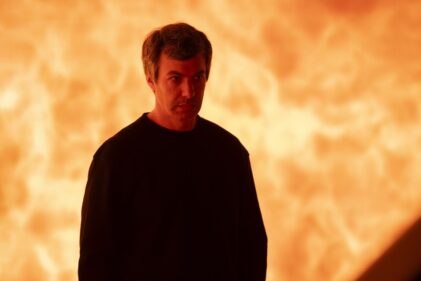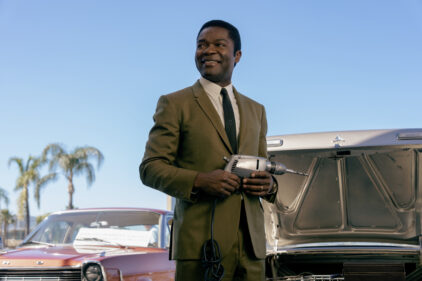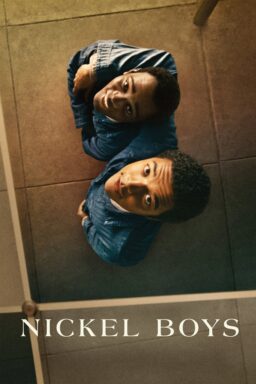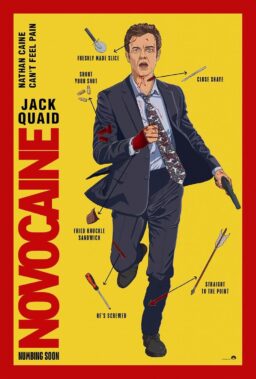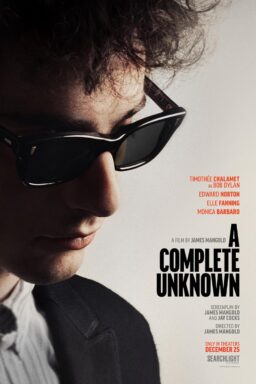Before we get HBO’s “Watchmen” remake and witness more stories of young mutants with the next “X-Men” movie, Netflix offers their own fusion of these superhero properties: “The Umbrella Academy”. Derived from the Dark Horse comics written by Gerard Way and illustrated by Gabriel Ba, this new series tells of siblings who have special powers, and are forced to evaluate their lives and relationships outside the world of fighting crime. But the intrigue garnered by this premise is defeated not just by its slow pacing (across ten, one-hour episodes) but also by the story’s superficial, and juvenile approach to such a story: it’s never as cutting edge or plainly cool as it so desperately wants to be.
Created by Jeremy Slater, “The Umbrella Academy” tells of seven special children who were born on the same day, after their respective mothers became suddenly pregnant. They were all adopted by billionaire Sir Reginald Hargreeves (Colm Feore), who made them into a family of crime-fighters, each with super abilities honed over time. There’s Diego (David Catañeda) who can throw a knife like a boomerang, Luther (Tom Hopper), whose extra burly physique covered by a coat is not just muscle, Allison (Emmy Raver-Lampman), who has the ability to control people’s minds with her words, Klaus (Robert Sheehan), who can see dead people but is also fresh out of rehab, and Ben, now deceased, who had the ability to unleash a murderous squid from inside his body. The highly intelligent, time-traveling Dr. Manhattan of the group is played by Aidan Gallagher, who, like his siblings was not named, and is simply known as Number Five. But unlike his siblings, he still looks like a preteen, which is one of a thousand details that “The Umbrella Academy” eventually explains before moving on to the next offbeat detail. But the standout of the group is Ellen Page’s Vanya, who has no powers. She can, however, play violin, and when she was younger, wrote the family’s saga in a tell-all book that’s created bad blood with her siblings.
At the start of “The Umbrella Academy,” the family is estranged and scattered—Luther is on the Moon, Allison is a movie star, Klaus is in rehab. But Hargreeves’ mysterious passing gets them back in the same gothic mansion for the first time in many years, forcing them to wrestle with their angst towards each other and their cold, distant father. True to the story’s exhaustive plotting, “The Umbrella Academy” has issues to resolve not just with regards to the past, present, but also the future—the apocalypse is coming in eight days, as Number Five finds out, and only they can stop it.

If a superhero story is only as interesting as its villain, “The Umbrella Academy” is in grave danger: it rambles when giving our heroes something to overcome, and fails to create an urgency in its expansive run-time despite all that the story focuses on. Their inner battles, with themselves and toward their siblings, are not all that compelling, even though that’s what the series wants its heart to be. The script wants to take a funhouse mirror to real expressions of family drama, but the world and tone of “The Umbrella Academy” is nowhere near grounded enough.
The external obstacles feel aren’t much more gripping: the revelation of apocalyptic stakes in episode one feels like “The Umbrella Academy” is following superhero trends and not subverting them, its story focusing on Number Five trying to figure out who is behind the destruction. On a smaller scale, the family members are not shown fighting crime in their their current lives, but they do battle two villains named Hazel and Cha Cha, played by Cameron Britton and Mary J. Blige, respectively. The latter duo are Tarantino-esque hitmen of a mysterious employer, and they don’t pop on screen when the focus is on them gabbing about their next job, or their friendship. True to the mild imagination of “The Umbrella Academy,” these characters are used mostly to inspire stylized action scenes, wearing goofy masks while they fire guns because it’s what amuses this show. I’ll give “The Umbrella Academy” that it is awesome to see Mary J. Blige walk away from an exploding donut shop in slow motion, but that’s a fleeting moment of edginess, and it arrives around episode eight.
The biggest enemy that “The Umbrella Academy” has is itself, thwarted by its ambitions to juggle all of these characters, their relationships, their mysteries. There are other characters too, like Vanya’s love interest Leonard played by John Magaro, and a couple of cops who are on the trail of everyone involved. Oh right, and then there’s the apocalypse. This busy nature initially makes for a slow start, as its pilot embeds us in their grief as means of gloomy exposition, but then it creates the opposite effect by the second and third episodes and onward—the series is both slow moving and overstuffed.
With all of these characters and their backgrounds, told by a story that yearns to create momentum out of constant cliffhangers and generally withholding information, the series is often frustrating, if not exhausting (I wouldn’t have made it past episode three were it not for professional obligations). There’s moments where this scatterbrained nature even strands the actors, like a scene in which Klaus experiences something so traumatic on a bus around episode five, yet we don’t know what he’s reacting to—we can only watch him cry his eyes out while Big Thief’s mournful spiritual “Mary” plays in the background, as if the simple presentation of emotion is all we need to be engaged. In a larger sense, it sucks the life out of top-tier talent like Ellen Page, who spends much of the series having her secrets revealed at a glacial pace, her performance becomes one big cloud until she’s given more to work with.

With the zealousness of a teenager’s sketchbook, “The Umbrella Academy” has a heightened imagination for its world-building and inhabitants, forcefully mixing sci-fi with fantasy with gothic production design and prep school costuming (Number Five is always in his academy uniform). But it doesn’t lead to a memorable collective style, so much as emphasize this show’s motivation to create cool without being original. The camera’s framing too, with high and low angles used often to spruce up dialogue-driven scenes, feels less like it comes from artistic intent, and more like a misguided idea of edgy visual storytelling.
Given that “The Umbrella Academy” is executive produced by comic co-creator Gerard Way, lead singer of My Chemical Romance, you’d expect a definitive quality from its music. It’s disappointing then, that the constant score plays with the obvious presence of a laugh track, and its soundtrack is full of familiar needle drops—Queen’s “Don’t Stop Me Now” amps up an otherwise bland shootout in a department store, while “I Think We’re Alone Now” by Tiffany blares during an impromptu dance moment in the pilot. Even “Exit Music” by Radiohead feels more ho-hum than it ever should. Maybe the show’s younger audience will find these cuts striking, and make a few Radiohead fans, but within “The Umbrella Academy” they’re totally played out. Their presence is a lot like the themes and visuals that define “The Umbrella Academy”—they’ll likely be most impactful if you haven’t experienced them numerous times before.
All episodes of season one screened for review.

